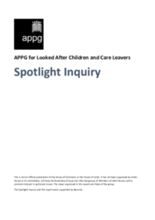This APPG report puts a spotlight on what ‘community’ means to care-experienced people and explores what might be done to help strengthen important community relationships and connections for current and future generations of children in care.
The report contains 15 practical recommendations for changes that could be made in the near future to improve the ways in which the care system supports young people to connect with their communities and highlights 5 broader areas where the authors feel serious reform is required that the Department for Education (and others) should consider in greater detail.
This final report brings together three strands of evidence gathering activity that formed the basis of the inquiry – a series of regional workshops for care-experienced people, professionals and others chaired by MPs that provided an opportunity to provide oral evidence, a series of workshops for children in care and care experienced young people to share their own thoughts and experiences and a call for evidence which comprised of written submissions from key organisations and stakeholders and creative submissions of art, poetry and other mediums from young people themselves. Throughout our evidence gathering we uncovered a range of important themes for reform:
People
Communities are made up of people and the roles of certain individuals in supporting young people to build links with the communities in their lives were of paramount importance. Of note were Family, Carers, Social Workers, Friends, other care-experienced young people and Independent Visitors and many of our recommendations focus on how to best support these core relationships.
However, to build strong relationships, the inquiry highlights two important underlying factors that need to be addressed.
The issue most explored was an underlying barrier – that of stigma. Across a range of different relationships – from the public and friends to professionals like social workers and teachers, care-experienced people reported a range of difficult prejudices they often felt they either had to overcome, or that prevented them from building the strong relationships they needed.
Care-experienced young people gave compelling evidence that in order to build relationships with other people there was an important pre-condition: having a good relationship with oneself. Evidence about high-quality life-story work and about opportunities for care-experienced people to explore all the different aspects of their identity – like their ethnicity, religion, sexuality, or nationality was widely received and often given additional emphasis.
Therefore, to strengthen relationships with the people that matter we make a range of recommendations about tacking stigma, exploring identity and improving relationships with those key people care-experienced people talked about most like their family, carers and social workers for example.
Place
Communities gather in physical or virtual spaces, and proximity to the people we love and care about and to support is crucial in supporting anyone to navigate life’s ups and down. It was unsurprising therefore that a lot of evidence that we gathered related to ‘place’. Perhaps the largest body of evidence related to placement instability. Whether this was multiple placement moves, or being placed out of area, it was clear that it is difficult to build connections with the place we live in, and other places that matter to us, if we’re constantly on the move. However, the evidence we gathered also suggested that even in circumstances where young people had experienced relative placement stability, they felt it was still challenging to access all the opportunities their local community might have to offer. Important examples were access to leisure opportunities and the ability to spent time with important local communities that helped young people explore different parts of their identity – like faith groups or other LGTBQ+ young people for example. One place-based community that all children in care and care leavers should have a strong and lasting connection with is their local authority. A range of evidence was provided that explored the idea of the ‘corporate parent’ and all the different ways in which local authorities could help build community links and support their young people to thrive.
The care ‘system’
If the first two themes of people and place focused predominantly on the ways in which individual young people could be better supported to build stronger relationships and community connections, the final theme looked at the bigger picture and explored ways in which reform of the care ‘system’ might help improve the situation. Evidence given around the ‘system’ was wide ranging. There were important questions about whether we invest enough in the care system, and specifically in the types of activity and support that help foster strong community links. There were also important observations about how a system based on assessing and reducing ‘risk’ to young people often hindered their ability to interact freely with different communities. Indeed, in our exploration of how the Coronavirus pandemic has affected the care system it was clear that under the extreme pressures of the pandemic it was often the elements of the system that supported young people’s relationships with people and place that were undermined the most – like cancelling social activities, reducing contacttime with family and professionals, and high levels of isolation. Finally, there was a significant body of evidence focused on the experience of becoming a care leaver. This is one area of the ‘system’ where the role of community, as young people leave childhood and grow in independence, is of critical importance. Those who gave evidence urged for more ambitious reform, supporting young people for longer, and reimagining the role of community for care experienced young adults.

